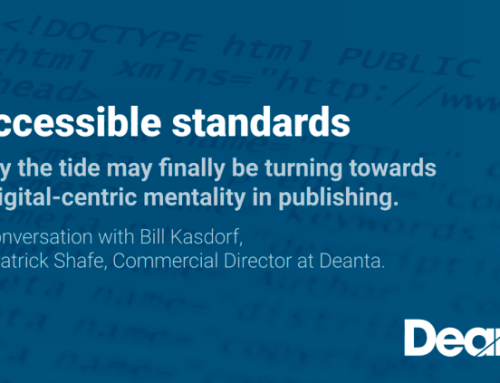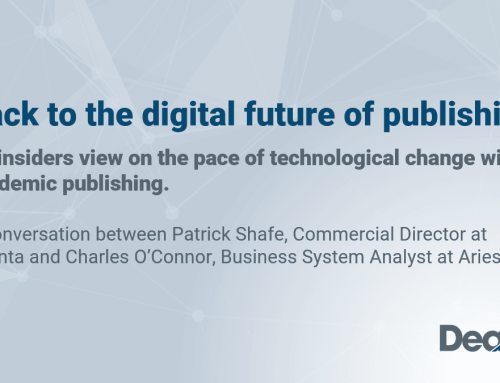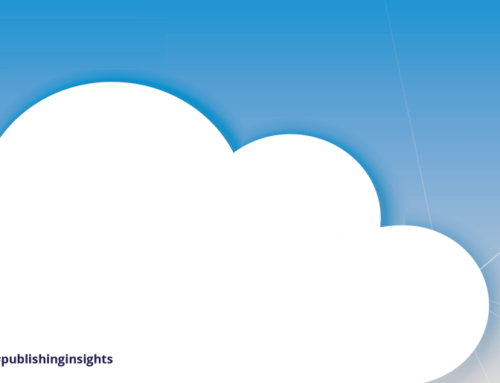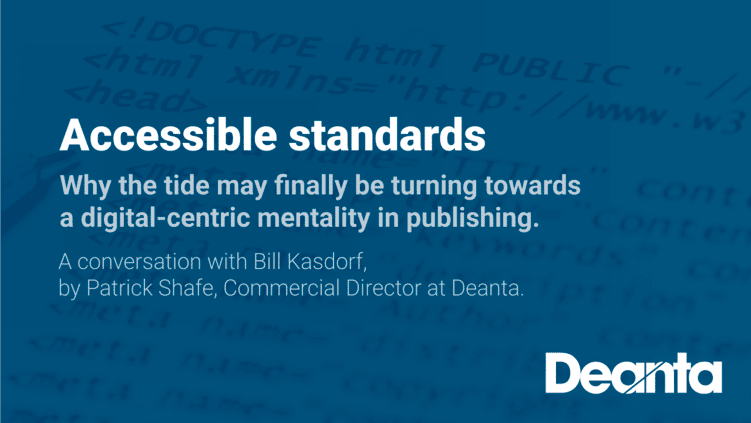An interview with Janine Burr-Willans, Deanta’s Director of Platform Delivery.
What was it that lead you to join Deanta?
A large part of my various senior roles in content management has always been horizon scanning and I had been watching Deanta’s company profile for a while. The company, especially its CEO Darren, is very open about sharing its vision and strategy. They understand the industry; the broader trends as well as the nuances that publishers face, and have always engaged with the wider publishing industry beyond their supplier niche. I like that.
I also like the innovation being driven at Deanta. The company is large enough to be significant but small enough to be nimble. Everyone in the business is very engaged in delivering the vision and strategy which means that Darren’s ambition can be turned into a practical output – it’s very tangible!
And has that reality been borne out in the time you’ve been here?
Absolutely. Our surveys and roundtables which look at industry drivers are really important, but I’ve also had such a lot of direct engagement with publishers around our product development roadmap. Our rapid-feedback, rapid-innovation, feedback loop (particularly post launch) has really validated that perception of Deanta as being plugged-in to the industry eco-system.
So how has being in a smaller company differed from the larger publishing environments you’ve been involved with in the past?
Publishing is, in many ways, a volume business. The Deanta team know publishing and are managing huge volumes of work day to day, so I’m certainly not here to teach them anything about publishing. I’m not looking to interrupt that flow, but I hope I can bring a level of knowledge and richness to the more strategic conversions that we can have with clients
Because of our size there is a level of direct contact with the market which is hard to replicate in a large, very siloed, corporate environment. I get to bounce ideas off my colleagues but have a significant degree of autonomy for the platform roadmap, which is exciting. I am getting to see the value of my wider experience result in some real tangibles for Deanta, and for the industry.
So, what have you been asked to do? What are these tangibles?
My title Director of Platform Delivery is carefully considered – the platform part is about ensuring that our network and relationships feed into what our Lanstad platform needs to do and why. The delivery part is about bringing an agile mindset and supporting a rapid sprint / feedback loop. This helps set the pace and ensures the delivery team meet the ambitions of the business.
Beyond Lanstad, a large part of my role is looking at the end-to-end publishing process – not just our own end-to-end processes. By understanding the upstream and downstream adjacencies, we can build products, of course, but beyond that we can bring value to clients who may themselves, need to ask questions around that evolving landscape.
And what does that evolving landscape look like to you, and what evolving form might Deanta take in it?
Publishing has started to look for growth from acquisitions in adjacencies – not from simply buying more content or titles. Recent examples like Wiley’s purchase of the hosting platform Atypon or MPS’s acquisition of High-Wire show that, increasingly, publishers are looking beyond their own niche. These acquisitions blur the boundaries between vendor and publisher and bring about cross-fertilisation of ideas and knowledge transfer. Deanta is very much part of this, and we are relishing the task of developing technology to support publishers who want to work across these networks.flanstag
Isn’t it odd to be building a tech stack, which has the potential to automate and cannibalise parts of our own business?
Ultimately, it’s about having a deep understanding of publishing and understanding the value that we bring to that system. It is not about how we can perform a specific task. We are constantly assessing the value that we bring and finding new ways of transferring that value into that content creation system to help our customers create a product. Undoubtedly that will mean that Deanta has a transformative journey too.
How do we bring clients along with us on this exciting journey?
For me, cultural fit is as important as the right finances. Publishers will have a more satisfying relationship, with tangible benefits and less business risk, if they are open to working in real partnership with vendors who, themselves, have a deep understanding of the industry, and who actually understand your aims and goals.
If you have partnerships across the supply chain, with companies that share your vision and ambition, and who understand not just the what but the why of what you are doing, there are rich opportunities for cross-fertilisation of ideas.
How might publishers “why’s” differ?
All publishers have a basic ambition to get content to market in a timely fashion and of a quality that helps dissemination. But at the next level, the ambitions of respective publishers will be dependent on their respective circumstances or the context surrounding their products. 2020, for instance, highlighted the need for rapid publishing of information about the pandemic. University Presses, on the other hand, may have a specific remit to publish according to the mission of their institution.
When I was a Content Management Director, it was equally important for me to understand the culture and ethos of the supplier we were partnering with. If the cultural fit is right then, the process of working together is easier and there are real, long-term commercial benefits.
In your experience, how open are publishers to strategic conversations with vendors?
Very. In my previous role at least 30% of my time was spent horizon scanning. But I was clear on where and with whom we would have operational or strategic conversations.
Operationally, once a vendor had been through a detailed selection and procurement process any ongoing operational discourse should be driven by KPI’s and SLA’s.
But what I do want to hear is “the new”, show me the development, what’s on the horizon, what are you building? It’s about innovation, the future product and systems development. Publishing is an industry of change and technology, and publishers have always been very open to these things.
If that’s the case how is it that many are not using innovative technologies (such as XML proofing)?
Well, many publishers are, but not for all products. There’s a misperception, for instance, that moving to XML proofing costs money, with vendors passing on platform build costs to publishers.
Larger publishers, who may have technology budgets, are constantly considering their business priorities; so, whilst they may see something that will help the business operationally – they may already have something in place which is working well enough, which is sufficient. In this instance they may decide on something which is a little sexier which might, for instance, help their author community.
Production costs are always under the microscope because library budgets, University funding and subscription sales are also under the microscope. Production Directors always have the option of replacing new for old and, if the P&L of your product supports it, they may be able to invest money to deliver speed or better service, but a publisher can’t do this in isolation – there has to be a return on investment on that.
But, surely, it doesn’t have to be that way? Our own platform Lanstad, allows publishers to drive operational efficiencies, eradicate errors and stop duplication of effort across all titles – for no additional costs at all!
Exactly, and that’s where there’s a massive benefit, particularly for smaller publishers, who may have a variety of publications that arrive from a variety of sources, through different workflows, and with different demands, so you end up with a portfolio that has different needs and flavours.
If you can simplify and standardise the workflow and apply core concepts; to enable you to be the same where you can be, and different where you need to be, a publisher can start to enjoy the economies of scale and standardisation without necessarily having that scale.
If you’re interested to find out what the best cloud-based technologies can do for your organisation, send Deanta an email today – pshafe@deantaglobal.com












